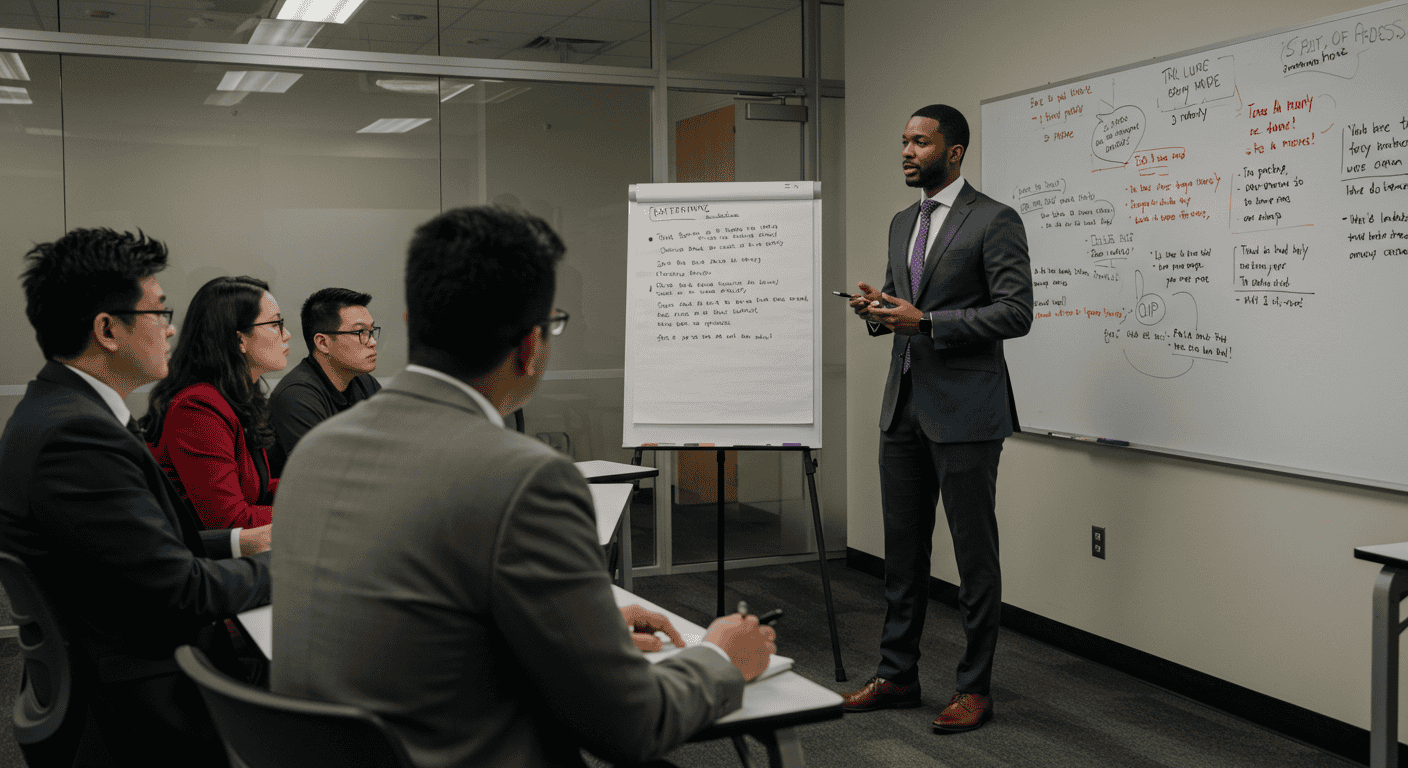Train The Trainer training in Malaysia is a course that focuses on developing skilled trainers who can effectively deliver training programs while considering local cultural nuances and learning preferences. The program emphasizes building training competencies that align with Malaysian adult learning principles and professional development standards.
The training incorporates Malaysian workplace values, multicultural communication approaches, and adult learning methodologies suitable for diverse local audiences. Special attention is given to developing trainers who can bridge cultural differences and deliver effective training across various industries.
Train The Trainer (TTT) Training in Malaysia
Who Should Attend TTT Training?
Corporate trainers, human resource professionals, subject matter experts, learning and development specialists, and individuals responsible for training delivery in Malaysian organizations should attend TTT training. This includes both new and experienced trainers seeking to enhance their training capabilities.
The program is particularly valuable for professionals who must design and deliver training programs in Malaysia’s multicultural environment, including those working in corporate, educational, and public sector organizations.
What Are The Core Training Methodologies Covered?
The training addresses essential adult learning principles, instructional design methods, and training delivery techniques adapted for Malaysian audiences. Participants learn various training approaches, including experiential learning, interactive workshops, and blended learning methodologies.
Special emphasis is placed on understanding different learning styles and adapting training methods to meet diverse participant needs within Malaysian training contexts.
How Is Training Design And Development Handled?
Participants learn systematic approaches to training design, including needs analysis, curriculum development, and learning material creation suitable for Malaysian training environments. The program covers instructional design models and content development strategies.
Special focus is developing culturally appropriate training materials and activities that resonate with Malaysian learners while meeting organizational objectives.
What Presentation Skills Are Enhanced?
The training develops essential presentation and facilitation skills, including platform skills, audience engagement techniques, and effective use of training aids. Participants learn to deliver training confidently in both English and Bahasa Malaysia.
The program emphasizes developing dynamic presentation styles while maintaining professional credibility and cultural sensitivity in Malaysian training settings.
How Is Assessment And Evaluation Managed?
Participants learn to develop and implement training assessment methods, including knowledge checks, skill evaluations, and program effectiveness measurements. The training covers both formative and summative evaluation techniques suitable for Malaysian training contexts.
Special attention is given to creating assessment tools that effectively measure learning outcomes while considering local educational and professional standards.
What Group Facilitation Skills Are Developed?
Training addresses effective group facilitation techniques, including managing group dynamics, encouraging participation, and handling challenging participants in Malaysian training environments. Participants learn to create inclusive learning environments that promote active engagement.
The program emphasizes developing facilitation skills that respect cultural hierarchies while promoting open dialogue and learning.
How Is Technology Integration Addressed?
Participants learn to integrate technology effectively in training delivery, including virtual training platforms, e-learning tools, and digital resources commonly used in Malaysian organizations. Training covers both traditional and modern training delivery methods.
Special focus is given to balancing technology use with personal interaction, considering varying levels of technological literacy among Malaysian learners.
What Training Administration Skills Are Covered?
Training addresses essential administrative aspects, including program planning, logistics management, and documentation requirements for Malaysian training contexts. Participants learn to organize and manage training programs efficiently.
The program emphasizes developing systematic approaches to training administration while meeting local organizational and regulatory requirements.
How Is Cross-Cultural Training Handled?
Participants learn to navigate cultural differences and deliver culturally sensitive training in Malaysia’s diverse workplace environment. Training covers cross-cultural communication techniques and adaptation strategies for different cultural groups.
Special attention is given to developing cultural intelligence and flexibility in training delivery across Malaysia’s multicultural landscape.
What Quality Assurance Methods Are Included?
Training covers quality assurance principles, including training standards, continuous improvement processes, and best practices in training delivery. Participants learn to maintain consistent training quality across different programs and audiences.
The program emphasizes developing quality control measures that ensure training effectiveness while meeting organizational and professional standards.
How Is Professional Development Enhanced?
Participants learn strategies for continuous professional development as trainers, including keeping updated with training trends, enhancing training skills, and maintaining professional certifications. Training covers career development pathways in the training profession.
Special focus is given to building professional networks and staying current with training innovations in the Malaysian context.
What Coaching And Mentoring Skills Are Developed?
Training addresses essential coaching and mentoring techniques for developing other trainers and supporting learner development. Participants learn to provide effective feedback and guidance while maintaining professional relationships.
The program emphasizes developing supportive coaching approaches that promote trainer excellence and continuous learning in Malaysian organizations.

